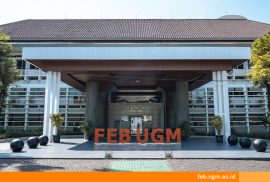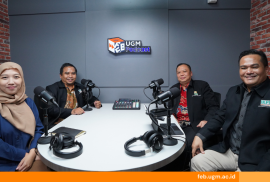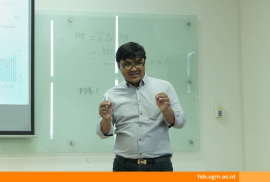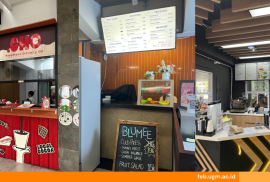Incentive policies are often considered an effective way to improve the performance of public services, including those in the health sector.
The heavy burden of unpaid work ranging from domestic chores to childcare supervision remains a significant barrier to Indonesian women’s participation in the labor market.
The Faculty of Economics and Business, Universitas Gadjah Mada (FEB UGM), graduated 54 undergraduate students in the Graduation Period II of Academic Year 2025/2026.
The Faculty of Economics and Business, Universitas Gadjah Mada (FEB UGM), continues to strengthen its commitment to fostering an inclusive and sustainable campus environment.
The digital transformation of Indonesia’s taxation system has entered a new phase with the introduction of Coretax, a platform envisioned as a “central hub” integrating all tax administrative services into a single system.
The Indonesian government has expressed optimism about achieving a national economic growth target of 8 percent.
The Faculty of Economics and Business, Universitas Gadjah Mada (FEB UGM), has demonstrated its commitment to delivering internationally recognized doctoral education by commencing the inaugural classes of the International Doctorate in Business (IDB) program.
Prof. Dr. Reni Rosari, M.B.A., a lecturer at the Department of Management, Faculty of Economics and Business, Universitas Gadjah Mada (UGM), was officially inaugurated as a Professor in Organizational Behavior.
The Faculty of Economics and Business, Universitas Gadjah Mada (FEB UGM), held a handover ceremony and inauguration for the leadership of the Student Executive Board (BEM), Student Representative Council (BPM), Department Student Associations (HMJ), and Student Activity Units (LK) for the 2026 term at Universitas Gadjah Mada.
The handover ceremony, which took place on Thursday (12/2/2026), was marked by the reading of an oath by the representative of the 2025 organization management, Sulthan Faiq Yunizar (Economics 2023), and the representative of the 2026 organization management, Matthew Nasry Kwejaori (Management 2024), symbolizing the end of the previous management period and the beginning of the new one.
In 2026, something new is happening at FEB UGM.
Can we help you?










